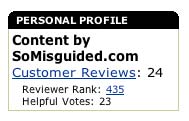Slate.com has an interesting piece on Amazon’s top reviewers. (Reviewers are the regular joes who post customer reviews on Amazon.) It seems that the top reviewers, who do get a certain amount of perks (in particular free books), are perhaps more influenced by those perks than by the actual value or literary merit of what they are reading.
There are two ways to spin this story.
1) The top reviewers are all hard working, random people, who love to read books and have figured out how to make the system work for them. Who doesn’t want more free stuff?
2) The top reviewers are all hard working, random people, who propel themselves to the top using any means possible so that they can gain fame, small fortune (in the form of free stuff) and Amazon status.
Brilliant or dodgey?
Quote: From Slate: This is not to say that a Top 10 ranking doesn’t come with some sub rosa incentives for the reviewer. Free books, first and foremost; in an e-mail, Grady Harp told me he was “inundated with books from new writers and from publishers who know I love to read first works.” This fall, when it invited select Top Reviewers to join its Vine program, an initiative, still in beta-testing, to generate content about new and prerelease products, Amazon extended the range of perks. “Vine Voices” like Mitchell and Harp can elect to receive items ranging from electronics to appliances to laundry soap. As long as they keep reviewing the products, Amazon’s suppliers will keep sending them.
Why does any of this matter? Because this breaks the illusion that the reviewers are impartial customers who review a book because they liked/disliked it.
This is the thing: books on tables in a store; book at the end of an aisle; books reviewed in newspapers, magazines and blogs; books tagged in Shelfari; books “recommended” in any form are open to placement (i.e., someone has paid or done something in exchange for that book to be there).
I’m a top 500 reviewer on Amazon.ca and I review books on my site. But I only review books that I have actually read. I only review books that I think are worth talking about. And apparently, I’ve only reviewed 24 books on Amazon.ca. I’ve certainly read and reviewed more than 24 books here so I could add some type of review to Amazon, bump up my rank and perhaps establish greater credibility for myself, thereby gaining the interest of more publishers and more reviewers so that I could get more speaking engagements and more books and maybe more business helping publishers promote their books.

So where’s the line between building your credibility as a reviewer and saying “this space is for sale”?
What do you think?
(Source: Thanks to Darren Barefoot for sending this over the Slate article.)